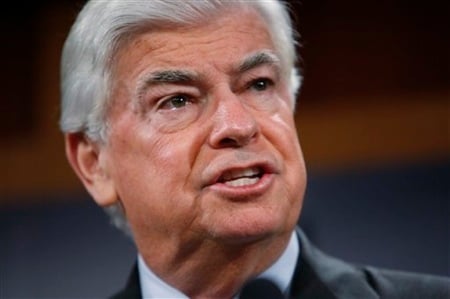On Monday, Sen. Christopher Dodd unveiled his latest plan to clamp down on financial services providers. On Tuesday, bankers and their lobbyists descended on Capitol Hill. A connection?
Financial institutions and their allies mobilized lobbyists and fueled their media campaigns Tuesday in a swift response to a Democratic plan to rein in Wall Street and protect consumers in their banking and borrowing transactions.
The U.S. Chamber of Commerce prepared a $3 million blitz aimed at members of the Senate Banking Committee, and banking lobbyists prepared amendments and looked for friendly senators to advance them.
Senate Banking Committee Chairman Christopher Dodd unveiled a 1,336-page bill Monday that would give the government unprecedented powers to split up firms that threaten the economy, force the industry to pay for its most spectacular failures and create an independent consumer watchdog.
The financial industry's immediate objections put pressure on senators to weaken the bill and created a series of obstacles for Dodd as he attempts to navigate between the Senate's institutional need for bipartisanship and the pull of liberals and consumer advocates who want to crack down on Wall Street.
The Obama administration ramped up its own countercampaign Tuesday, sending Treasury Secretary Timothy Geithner on a round of television appearances to signal that the White House is not in a compromising mood.
"We are going to look for ways to make it stronger," Geithner said on Fox Business Network. "And we are going to resist efforts to weaken it."
Dodd hopes to get the bill through his committee next week, preparing it for action on the Senate floor sometime after Congress's two-week Easter recess.
The consumer bureau, which would be located within the Federal Reserve but have fairly autonomous powers, promptly emerged as the main industry target. Bank officials said Dodd unnecessarily separated the functions of the Fed and other regulators from the consumer agency. The chamber argued that the watchdog's reach would extend to small businesses.
"Our basic argument is that effective consumer protection can be achieved without creating a giant new bureaucracy with unlimited powers, unlimited scope to regulate businesses that had nothing to do with the crisis," said David Hirschmann, president of the Chamber's Center for Capital Markets Competitiveness.
The chamber is focusing its message in six states, five of them home to members of the Senate Banking Committee — Democrats Mark Warner of Virginia, Tim Johnson of South Dakota, Evan Bayh of Indiana and Jon Tester of Montana, and Republican Bob Corker of Tennessee, who attempted to negotiate a bipartisan deal with Dodd.
Also in the chamber's sights is Democrat Blanche Lincoln of Arkansas, who is facing a difficult re-election and who chairs the Senate Agriculture committee. The agriculture committee is helping write legislation governing derivatives, highly complex transactions blamed in part for the financial crisis. The chamber is working with a coalition of corporations that want to be exempt from some restrictions because they use derivatives as hedges against market fluctuations, not as investment opportunities.
The chamber mounted an earlier campaign against a House version of the legislation. The bill, which contained a freestanding consumer protection agency, ultimately passed on a strict party-line vote.
Hirschmann said the bureau proposed in Dodd's bill would have too many powers to write and enforce regulations, even on the smallest institutions on the basis of the bill's unspecified "abusive practices."
Dodd spokeswoman Kirstin Brost shrugged off the chamber concerns.
"Since when in the history of the United States have we seen consumer financial protections gone wild?" she said.
But Warner indicated that the provision could undergo revisions.
"In consumer protections there may be some changes that could be made," he said in an interview. "Chairman Dodd tried to strike a balance on this. I think it's a good starting point."
Besides their consumer protections concerns, the largest financial institutions also began raising alarms over Dodd's desire to prohibit bank holding-companies that have commercial bank operations from engaging in risky trades. The banking industry has interpreted Dodd's bill as ordering regulators to ban such proprietary trading.
But Dodd's bil,l while saying that regulators "shall" prohibit such trades, also states that such regulations will be subject to the "recommendations and modifications" of a Financial Stability Oversight Council chaired by the treasury secretary and composed of the heads of financial regulatory agencies.
"These areas of proprietary trading, private equity and hedge funds need extra scrutiny," Warner said. "I would be reluctant to prescribe what that action ought to be."







